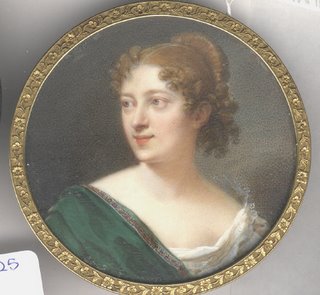 This miniature portrait is signed "D Bossi p 1816", for Domenico Bossi (1760-1853). Although he was born in Italy, he worked in many of the major European capitals and there are 36 works by him in the Stockholm National Museum.
This miniature portrait is signed "D Bossi p 1816", for Domenico Bossi (1760-1853). Although he was born in Italy, he worked in many of the major European capitals and there are 36 works by him in the Stockholm National Museum.Schidlof comments "Bossi can be considered as one of the best miniaturists of his period; in particular his works of the 18C are remarkable for expression and relief. In his first period he painted the shadows in surfaces using contrasts of sometimes hard (and) light parts. The hair is painted in gouache rapidly, with great steadiness. Later he stumps (sic) the change from light to shadow carefully, which makes his portraits more pleasant, sometimes mawkish, and takes away from them much of their vitality. The clothes are always very well painted in his second period with many details. The background, almost always brown or blue-grey, is sometimes executed in gouache, but more often with very regular crossed stokes."
This particular miniature is mentioned in Schidlof, where it is stated it was exhibited at Reichenberg in 1903 and Berlin in 1906, as item 548.
 Although unidentified when purchased for this collection, the sitter was able to be identified with very kind assistance from a portrait miniature expert, who found a photo of the miniature which appeared in a Schidlof, Vienna auction catalogue of 5-9 April 1921.
Although unidentified when purchased for this collection, the sitter was able to be identified with very kind assistance from a portrait miniature expert, who found a photo of the miniature which appeared in a Schidlof, Vienna auction catalogue of 5-9 April 1921. At that time it was being sold from the Simon Ritter v. Metaxa collection and the sitter was described as Baroness Leopold Neuwall, but the sitter had then "lost" her identity in subsequent years.
It is thus an important miniature that had "disappeared" from view for eighty years, until it was acquired for this collection.
Baroness Neuwall was the wife of a very wealthy Austrian banker, Marcus Leidesdorf, who was raised to the nobility in 1817, after being a key supplier during the War of Liberations in 1813-14. He was Jewish, but previous to 1817, Jews were prevented from owning land, thus earlier requests to be raised to the nobility were declined.
While Marcus remained Jewish his entire life, the glamour of nobility caused Marcus’ children to convert to Christianity during his lifetime. This must have been very difficult for him to deal with, see Nobility
 Literature: Les Peintres en Miniature p111. 290
Literature: Les Peintres en Miniature p111. 290
No comments:
Post a Comment